Top 10 Best Anesthesiology Hospitals in Bangalore

Top 10 Best Anesthesiology Hospitals in Bangalore
Hospitals are institutions of health care that offer services around-the-clock, seven days a week, and have structured medical and other professional personnel. With the aid of diagnostic curative service, they provide a variety of acute, convalescent, and terminal care. According to this definition, a hospital is one of the fundamental pillars of society. In a nation, there are enough hospitals, each equipped with the right facilities and resources to provide the care and attention that the government feels is necessary for its population. Today, hospitals play an increasingly important role in people’s lives.
Hospitals are places where people receive medical care. The staff of a hospital is made up of doctors and nurses who look after the patients. However, there are a lot of other individuals who work in administration. Hospital staff members receive training in a variety of health sciences and support jobs. To improve the patient’s health, they employ specialised training and medical equipment. These facilities are essential for both the treatment of sick people and the prevention of a variety of ailments. These specialists take care of staffing, housekeeping, and hospital policies and procedures. The administrative team is also in charge of staffing, hiring, and professional development.
Hospitals contain a wide variety of departments. These divisions offer nursing care, nutritional testing, counselling, and medical supplies as well as patient support. The upkeep and administration of hospital facilities, staffing, budget planning, and personnel development plans are among these departments’ administrative duties. The majority of these departments are set up to accommodate patients’ demands. These departments are responsible for many separate tasks. They must be able to meet all of the patients’ needs.

Patient care is supervised by the nursing department. Its goals are to help patients get health services and advance nursing education. To assist nurses and other healthcare professionals, the majority of hospitals have nurse-midwife programmes. The hospital serves as the hub of the healthcare system and supports other service providers. Coordinating care is its primary responsibility. The majority of hospitals offer training to aspiring medical professionals. They also carry out a clinical investigation.
Patient support services offered by hospitals often consist of nursing, nutrition diagnostics, counselling, and pharmaceutical care. The administrative division is in charge of managing staffing as well as facility upkeep. The welfare of the patient is given top attention. The administrative team is responsible for a wide range of tasks. Patients are assisted by the nursing personnel. The inventory of medicines and supplies is managed by the pharmacy and pharmaceutical care divisions. The management and advancement of medical supplies and equipment are within the purview of the hospital’s management.
Non-profit hospitals assist citizens to afford health insurance, lower expenses associated with chronic and avoidable diseases and support their workforce requirements when they address socioeconomic challenges in the communities they serve. Building local wealth makes it easier for locals (who are probably patients) to pay for care. Additionally, addressing the social determinants of health might help avoid or considerably lower the expense of managing chronic illnesses like diabetes, which disproportionately impact low-income people.
Nursing and nutritional diagnostic services are among the various tasks that a hospital completes. Medical equipment and pharmaceutical care are also given to patients. The creation of policies and personnel, cleaning, material and property management, laundry, transportation, and engineering are all examples of administrative services in a hospital. An effective hospital operation is aided by a team of doctors, nurses, and numerous maintenance services.

As hospitals provide continuous and comprehensive services for acute and complex disorders, they enhance and complement many other components of the healthcare system. To effectively address the demands of the population’s health, they focus limited resources on well-designed referral networks. Most people place a great deal of significance on hospitals, as they are often regarded as landmarks in their lives. Hospitals contribute to the coordination and integration of care, which is important to health systems.
Hospitals frequently serve as a venue for training medical students, nurses, and other healthcare workers, and they serve as an essential foundation for clinical research. The development of the health system also requires hospitals. A new vision for hospitals is currently being driven by external forces, flaws in health systems, and problems in the hospital sector in many parts of the world. They are crucial to this vision’s community outreach, home-based services, and support of other healthcare providers. They are also crucial to a strong referral system.
Anaesthesia
As the name suggests, anaesthesia is the use of anaesthetics for medical procedures. With the help of these medications, the patient is pain-free during medical procedures. Medical professionals who give anaesthetics and treat pain are known as anesthesiologists. A portion of the body may become numb with a specific anaesthetic. The patient is rendered unconscious during invasive surgical operations by general anaesthesia.

The process of Anaesthesia: what does it involve?
The temporary blockage of sensory and pain messages from nerves to brain regions is known as anaesthesia. The medical practice called anaesthesia prevents the patient from feeling pain while undergoing procedures or surgery. Anaesthetics are the names of the drugs that are used to block pain. Different anaesthetic types function in various ways. Some anaesthetic drugs numb specific body areas, while others numb the brain to induce sleep during more invasive surgical procedures, such as those carried out on the head, chest, or abdomen.
Who performs Anaesthesia?
The person operating can give the local anaesthetic if it is a reasonably straightforward process, such as a tooth extraction that only needs to numb a small region. Anaesthesia will be given by an anesthesiologist for more intricate and invasive procedures. The patient’s pain is managed by this doctor before, during, and after surgery. The anaesthetic team may also include a certified registered nurse anaesthetist (CRNA), a certified anesthesiologist assistant (CAA), or other physicians who are still in training (fellows or residents).
Anesthesiologists assist in pain management because effective pain control improves surgical results and speeds up recovery by lowering postoperative complications. They enable the doctors to perform the procedure safely and comfortably.
What varieties of Anaesthetic are there?
The nature and extent of the surgery determine the anaesthetic your healthcare professional will employ. The options consist of:
- Local Anaesthesia: A tiny area of the body is made to feel numb via local anaesthetic. Examples of treatments where local anaesthetic might be used include skin biopsies, dental work, and cataract surgery. Throughout the procedure, the patient is awake. Local anaesthesia is injected right around the surgical site. This is appropriate for relatively simple operations. Anaesthetists are asked to be “stand-by” to provide sedation, pain medication, or anaesthesia needed if there is concern that the patient might become worried or that the surgery might be longer than anticipated.
- Regional Anaesthesia: A bigger area of your body, such as a leg or everything below your chest, is numbed with a regional anaesthetic. In addition to the localised anaesthetic, you can also receive sedation to keep you asleep during the treatment. It is when a local anaesthetic injection is used to temporarily numb the area that needs to be operated on while the patient is still conscious. Spinal anaesthesia is the term used when the injection is given into the spinal cord’s protective fluid. Epidural anaesthesia is the term used when local anaesthetics are administered around the sheath that surrounds the spinal cord. Placing an injection around specific nerve groups is known as a “plexus block.”
- General Anaesthesia: With general anaesthesia, you are rendered unconscious and unresponsive to pain or other external sensations. For more extensive surgeries or operations on the head, chest, or abdomen, general anaesthesia is employed. During this treatment, the patient is maintained completely sedated and pain-free by the continuous administration of anaesthetics. After the procedure, the anaesthetic’s effects are reversed, and the patient is awakened.
- Sedation: You become more naturally sleepy thanks to sedation, yet you can still be quickly awakened. If the person doing your surgery and a nurse have received training in providing moderate sedation, they can both administer light sedation. Examples of operations carried out under light or moderate sedation include some colonoscopies and cardiac catheterization. An anaesthesia specialist will administer deep sedation since the heavier anaesthetic drugs may impair your ability to breathe, but you will fall asleep faster than under light or moderate sedation. You won’t be asleep, but you won’t recall the process as well.
How exactly is Anaesthetic delivered?
Your healthcare professional may provide anaesthetic using one of the following methods, depending on the surgery and type required:
-Inhaled gas.
-Injection, whether it is intravenously (IV) or as a shot.
-Topical liquid, spray, or patch (applied on skin or eyes).
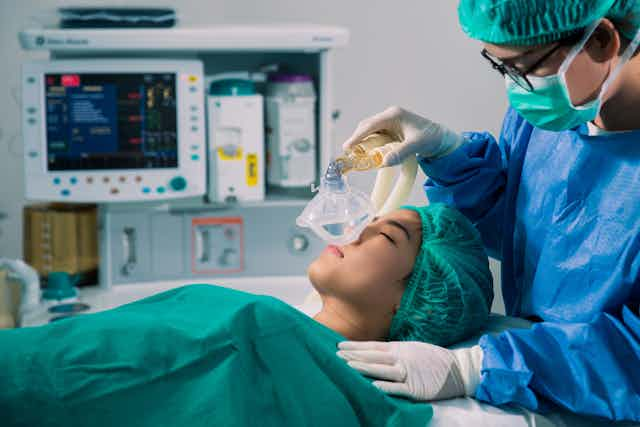
What takes place under Anaesthesia?
An anesthesiologist doctor:
- Administers one kind of anaesthesia or a mixture of the above-mentioned anaesthetics, pain treatments, and perhaps anti-nausea drugs.
- Monitors vital signs such as heart rate, blood pressure, blood oxygen level, and pulse.
- Addresses issues like an allergic response or a change in vital signs by identifying and treating them.
- Provides pain treatment following the surgery.
What possible side effects might Anaesthesia have?
The majority of anaesthetic side effects are transient and usually disappear within 24 hours. You may experience these depending on the anaesthetic kind and how healthcare professionals give it;
- Pain in the back or muscles
- Low body temperature that results in chills (hypothermia).
- Fatigue.
- Headache.
- Itching.
- Vomiting and nauseous.
- Bruising, redness, pain, or discomfort at the injection site.
- Unwell throat (pharyngitis).
What are the possible dangers or risks of Anaesthesia?
Millions of people have medical operations under safe anaesthesia each year. Anaesthesia does, however, come with some danger. Complications that could arise may include:
- An estimated 1 in 1,000 patients who get general anaesthesia experience awareness during surgery for unclear causes. Despite being unable to move or speak, you could be conscious of your surroundings.
- Surgery involving general anaesthesia or a breathing tube may result in a collapsed lung (atelectasis). This uncommon issue happens when fluid collects in or deflates the air sacs in the lung.
- Malignant hyperthermia (MH) is a hazardous anaesthetic reaction that affects people who have it. During surgery, this uncommon hereditary condition produces muscle spasms and fever. To prevent medications that cause this reaction, it is crucial to discuss any personal or family history of MH with your doctor or anesthesiologist before your anaesthesia.

- Nerve damage is another side effect. Although uncommon, some patients do have nerve injury that results in neuropathic pain, numbness, or weakness that might last for a while or never go away.
- Delirium following surgery is more common in older individuals. For about a week, this condition creates bewilderment that comes and goes. Some people struggle with learning and long-term memory. Postoperative cognitive dysfunction is the medical term for this condition.
Who is susceptible to issues from Anaesthesia?
Receiving anaesthesia carries a higher risk due to several reasons, such as:
- A mature age.
- Renal illness or diabetes.
- A history of malignant hyperthermia in the family (anaesthesia allergy).
- Strokes, heart disease, or high blood pressure (hypertension).
- Asthma and chronic obstructive pulmonary disease are two examples of lung diseases (COPD).
- Obesity (high body mass index or BMI).
- Neurological conditions or seizures.
- Apneic sleep.
- Smoking.
These are the top 10 best Anesthesiology Hospitals in Bangalore.
1. Apollo Spectra Hospital
Location- Koramangala, Bangalore, India
Established in- 2002
Total Beds- 20
Number of Doctors- 39
Multi-Specialty

Apollo Spectra Hospital in Koramangala is a speciality hospital that offers you professional and high-quality treatment in a more welcoming and accessible setting. Medical professionals, cutting-edge technology, and infrastructure work together to provide individualised care that promotes faster healing with virtually no risk of infection. Patients’ experiences are stress-free thanks to its simple admission and discharge processes.
With 20 beds, this advanced speciality hospital combines the best medical care with the most effective healthcare management practices. More than 12 surgical specialities are provided by the hospital, including Bariatric Surgery, Varicose Veins, General & Laparoscopic Surgery, Orthopaedic & Spine, ENT, and Urology. There are four high-tech modular OTs, a cutting-edge rehabilitation unit, an on-site pharmacy, and a waiting lounge for patients’ families in the hospital’s 20000 square foot space.
The Apollo Spectra Hospitals Group continues to set new standards in healthcare with 17 locations spread around 12 cities: Bengaluru, Chennai, Gwalior, Hyderabad, Jaipur, Kanpur, Mumbai, Delhi, Noida, Gurugram, Patna, and Pune. They have also performed over 2,50,000 successful surgeries with excellent clinical results. 230 healthcare experts, including 175 specialist consultants, have committed themselves to set new standards in healthcare services with the singular goal of providing streamlined, high-quality care to patients.
edited and proofread by nikita sharma
The centres of excellence for Apollo Spectra cover a wide range of surgical procedures, including those that are uniquely carried out at Apollo Spectra in India. Speciality hospital Apollo Spectra offers expert, high-quality healthcare with all the benefits of a large hospital but in a more convenient setting.
Apollo Spectra Hospital in Koramangala offers top-notch healthcare services with all the conveniences. The hospital is committed to providing top-notch medical care. The hospital uses high-end technology to give individualised care for a quicker recovery with no risk of infection in addition to top doctors and cutting-edge infrastructure. More than 230 healthcare professionals, including 175 speciality consultants, are establishing a new standard for healthcare services.
2. Manipal Hospital
Location- Jayanagar, Bangalore, India
Established in- 2008
Total Beds- 80
Number of Doctors- 69
Multi-Specialty

Manipal Hospital is a cutting-edge multi-speciality facility that opened its doors on October 25, 2008, in the middle of South Bangalore. The Manipal Hospital in Jayanagar embodies its commitment to superiority and quality. The hospital has established a niche for itself by offering a broad range of specialities, clinical expertise, and nursing care. The hospital provides the best atmosphere and services for in-patient, out-patient, and daycare treatments as part of one of the largest private hospital networks in the nation.
The hospital does everything in its ability to provide its patients with what they need: a quicker recovery and peace of mind. This is done with the notion that offering individualised care will result in a swift recovery. The hospital also accommodates unique preferences and needs to make sure that nothing is overlooked while the patients are there.
The health of patients is the most essential issue, hence Manipal Hospital has devoted all of its resources to offering first-rate tools and services. The hospital has high-end operating rooms, Intensive Care Units (ICUs) that meet international standards, and 80 beds. The facility is centrally air-conditioned, which guarantees the highest level of hygiene and reduces the possibility of cross-contamination. Manipal Hospital, one of the best multi-speciality care facilities in the city, stands out thanks to its highly skilled staff, advanced technology, and cutting-edge apparatus.
Manipal Hospitals play a crucial part in all facets of South India’s healthcare system. A social seed that was sown more than 50 years ago has blossomed into the third-largest healthcare organisation in the country, with a network of 15 hospitals that provide comprehensive, preventative, and curative care for a variety of patients from India and around the world.
Manipal Hospitals’ mission is to establish a framework for multispecialty tertiary care healthcare that is affordable and available through all of its delivery options, including home care. Pharmaceutical corporations frequently choose and respect the group’s main hospital in Bangalore, which is NABH-approved and listed among the Top 10 multispecialty hospitals in the nation, for conducting drug trials.
The Old Airport Hospital in Bangalore served as the foundation for the Manipal Hospitals Group, the largest and most famous network of multispecialty private hospitals in India when it first set off on its journey in 1991. Since then, the hospital has continually enhanced both Indian healthcare services and medical research. Thanks to their dedication and superior medical services, Manipal Hospitals have stood out among Indian healthcare providers.
3. NU Hospitals
Location- Padmanabhanagar, Bangalore, India
Established in- 1999
Total Beds- 62
Number of Doctors- 16
Super-Specialty

A healthy body is a foundation for a healthy mind, and NU Hospitals, situated in Padmanabhanagar, Bengaluru South, has been guaranteeing this for the past 20 years with impeccable service and dedication to putting patients first. A 60-bed hospital that was first opened in July 1999 has grown to become one of Bangalore and India’s top centres for nephro-urology care.
The core group of top-notch nephrologists, urologists, and fertility specialists at NU Hospitals, Padmanabhanagar, is what makes it the most sought-after and frequently visited the hospital for kidney care. All patients at NU Hospitals, feel safe in their hands because of the doctors’ and nurses’ exceptional nursing and care. As grateful patients continue to refer more people in need of excellent care, NU Hospitals, Padmanabhanagar, which was founded on faith and is dedicated to family health, continues to win many hearts.
NU Hospitals was founded as a super speciality hospital for nephro-urology treatment. It is Karnataka’s first specialised nephro-urology centre and one of the top nephro-urology hospitals in southern India. For more than 20 years, many of its staff members have worked at the first nephro-urology centre in Karnataka. Numerous members of the medical staff have been practising nephro-urology for more than 20 years, keeping up with developments in a fast-evolving speciality.
All of this has given this hospital a high level of experience, knowledge, and expertise in providing high-quality nephro-urology care. This high-level experience, knowledge, and expertise are further ensured by its strengths, which include its seasoned professionals, cutting-edge technology, strict adherence to quality protocols at all levels, and advanced research, to name a few. This in turn fosters a high quality of life.
Not only this, the hospital makes an effort to offer knowledgeable guidance and moral treatment. The National Certification Board of Health Care & Hospitals granted NU Hospitals accreditation in 2013 and the National Accreditation Board of Laboratories granted NU Hospitals accreditation in 2012. The first and only independent nephrology facility in the nation to receive these two honours.
To invest more in healthcare, NU Hospitals, Padmanabhanagar recently introduced NU Fertility, an in-house fertility care facility, in 2020. At NU Fertility, you are in the hands of fertility experts who have subject matter expertise, an understanding of technology, and a human touch.
4. Specialist Hospital
Location- Kalyan Nagar, Bangalore, India
Total Beds- 150
Number of Doctors- 27
Multi-Specialty

In Kalyan Nagar Bangalore, there is a multi-speciality hospital called Specialist Hospital, which is well-known for its medical knowledge, first-rate nursing care, and accurate diagnoses. A dedicated team of senior doctors at the Specialist Hospital provides care in the areas of orthopaedics, general surgery, gynaecology, paediatrics, plastic surgery, oncology, cardiology, neurosurgery, gastroenterology, ophthalmology, and physical therapy. The objective of Specialist Hospital, Bangalore is to be a patient-friendly hospital while its ambition is to provide high-quality healthcare at an accessible price.
In addition to a modern Dialysis Unit, a 24/7 Cardiac Centre, a Physiotherapy Unit, a NICU, an ICU, a CCU, and a 24/7 state-of-the-art fully computerised Pathology and Radiology Department with ultra-modern equipment for accurate and prompt diagnosis and analysis, the Specialist Hospital has 150+ Beds, including Ultra Deluxe, Deluxe, Executive Special, Special and Semi-Special 2 Sharing. The hospital has partnerships with more than 20 top insurance providers and third-party administrators, allowing its patients to receive treatments without paying cash.
The integrated model used by the centre of excellence at Specialist Hospital, Bangalore, which includes a dedicated cardiac hospital, an outpatient department, a 24/7 emergency wing, a hybrid cath lab, and a bedded dialysis unit, has allowed it to become a leader in the healthcare system. To all of its patients, it provides comprehensive knowledge, cutting-edge technology, and a compassionate attitude. The Super Speciality Hospital in Bangalore treats each patient with warmth and compassion, making it the New Face of Healthcare. The centre is the only healthcare facility in East Bangalore that offers services to all healthcare system segments.
With a network of 3 medical facilities, including Oral Healthcare, Pharmacy Retail, and other health-related services in Bangalore, the Specialist Hospital in Kalyan Nagar is an integrated healthcare provider. In terms of specialities, the centre provides a wide range of services, including cardiology, cardiac surgery, nephrology, urology, neurology, orthopaedics, internal medicine, gynaecology, paediatrics, and gastroenterology.
The latest completely computerised pathology and radiology department, as well as diagnostic tools such as a 64-slice CT scan, silent MRI scan, endoscopy, ultrasound, ECG, Echocardiogram, X-ray, and mammography, support the surgical specialities and enable rapid diagnosis.
Teamwork, Integrity, Responsibility, and Compassion are among its key principles. It has offered top-notch services for many years. To guarantee that everyone receives the best medical care necessary, the hospital has fostered a strong culture of providing high-quality healthcare with compassionate patient care. From a single chamber joint clinic to the multi-specialist hospital it is today, Bangalore’s Super Speciality Hospital has grown. At Specialist, the staff firmly believes that by taking charge of your health and being aware of any hazards connected to your present way of life, you will be more equipped to take care of your well-being.
5. Aster CMI Hospital
Location- Hebbal, Bangalore, India
Established in- 2014
Total Beds- 500
Number of Doctors- 87
Multi-Specialty
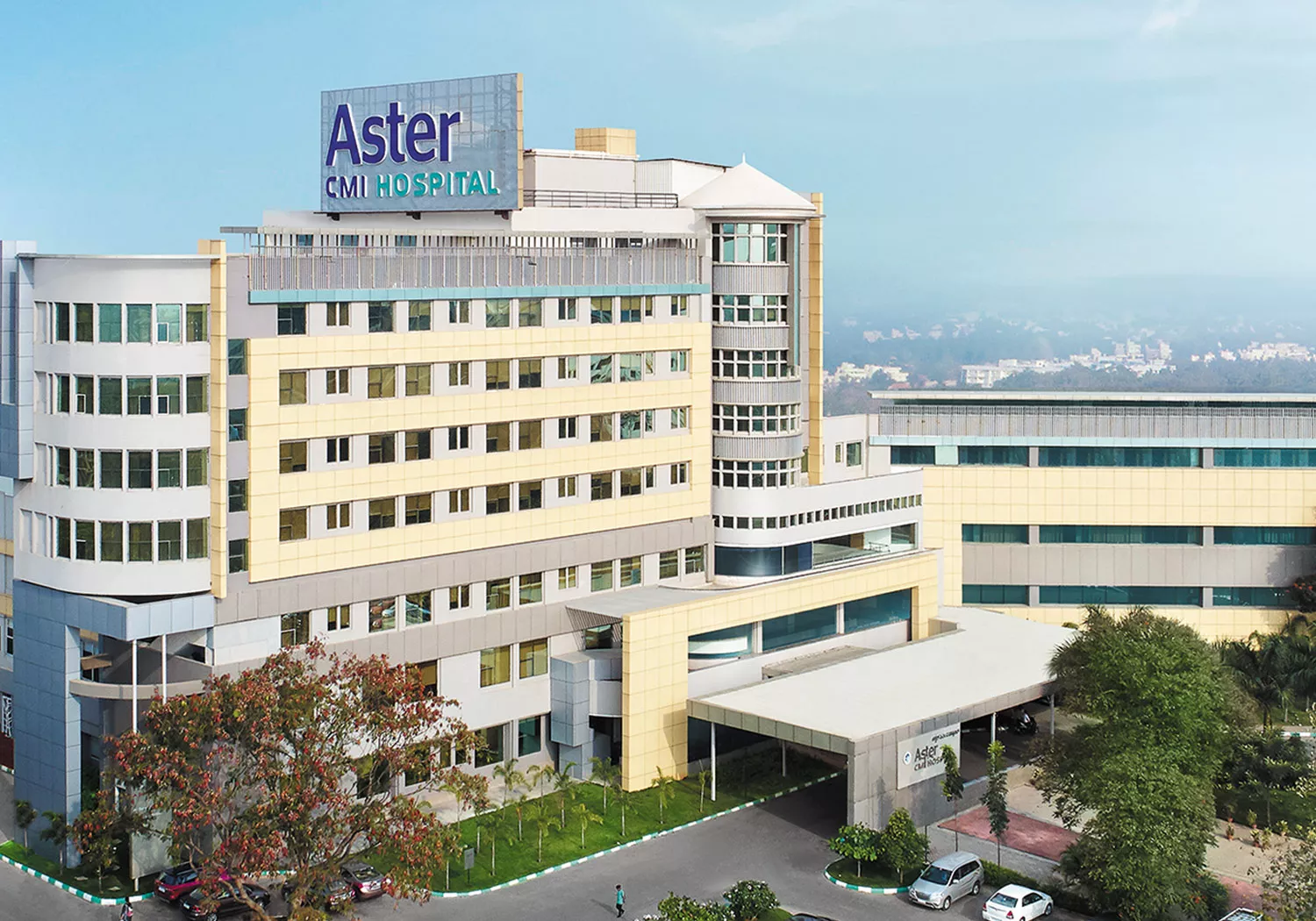
With 280 locations across 9 countries, Aster DM Healthcare has evolved from a single medical facility to a performance-driven healthcare company. It is now a growing network throughout the Middle East and India. In the MENA region, Aster DM Healthcare is one of the largest and fastest-growing conglomerates. Hospitals, outpatient facilities, and retail pharmacies are all part of a vast portfolio.
The Aster DM network, which has its corporate office in Dubai, currently has 13,477 employees, 1003 doctors, and several clinics and diagnostic facilities that have JCI accreditation. With Aster DM Healthcare, innovation and setting new benchmarks are always at the forefront of the business. The Aster CMI Hospital is a step in the direction of this special goal. With a commitment to creating a healthier future and elevating healthcare to the highest level, each of the Group’s verticals represents a mark of distinction.
Aster CMI Hospital, one of the leading hospitals in Bangalore, has consistently strived to deliver the best clinical outcomes by combining a serene environment with spacious furnishings, state-of-the-art medical technology, and the best physicians. As a result of its continued efforts to create a top-tier patient-centric hospital, it has cemented its position among Bangalore’s top multispecialty hospitals according to the Times of India’s All India Multispecialty Ranking Survey.
It holds that all patients ought to receive comprehensive care in a venue other than a hospital. One of Bangalore’s top super-speciality hospitals, it offers complete primary care through quaternary care services in contemporary, cutting-edge facilities with room for about 500 beds. It works to create excellent clinical standards and consistently raises the bar as one of Bangalore’s most reputable multispecialty hospitals.
The Aster CMI project is a component of DM Healthcare’s ongoing mission to create a world-class hospital focused on the needs of its patients in Bangalore. The Aster DM Healthcare organisation built a complete multispeciality hospital with modern, advanced amenities that can accommodate roughly 500 beds after taking on the challenge of rebuilding the existing enormous edifice. Everything at Aster CMI is designed with the patients’ comfort as the primary goal.
The Aster CMI Hospital is an extension of DM Healthcare’s mission to construct world-class hospitals. The hospital provides a wide range of medical services and is one of the largest and fastest-growing conglomerates. The hospital has a skilled team of professionals that work hard to provide top-notch medical care.
It provides comprehensive primary care to quaternary services and excels in the domains of gastroenterology, cardiac sciences, neurosciences, integrated liver care, surgery and allied specialities, urology and nephrology, adolescent health, and other areas. A restaurant, blood bank, radiology department, waiting room, parking, and lab are all located at the facility. All of the rooms are spacious, outfitted with modern amenities, and beautifully decorated to provide a healing environment.
6. Apollo Hospitals
Location- Seshadripuram, Bangalore, India
Established in- 2015
Total Beds- 200
Number of Doctors- 55
Multi-Specialty

A whole variety of healthcare services are offered under one roof at Apollo Hospitals Bangalore, a multi-speciality hospital of international renown and JCI accreditation. On August 1, 2015, Apollo Hospitals, Sheshadripuram began operations as the third hospital in Bangalore and the fourth in Karnataka. It is a 200-bed multi-speciality hospital with a state-of-the-art emergency room with 10 beds, an intensive care unit with 40 beds, and other beds for patient care.
This hospital primarily serves the Sheshadripuram and Malleshwaram neighbourhoods in central and northern Bangalore. The largest mall in the state, Mantri Mall, and the metro station are both adjacent to the hospital. The hospital also provides care for several of the major corporations with headquarters in this area of the city, including IISC, ISRo, ABB, ITC, etc.
Since it first started operating, the hospital has been offering high-quality care in line with the group’s ideology. The hospital, which mostly serves patients from Seshadripuram and Malleshwaram, is accredited by the Joint Commission International. The multi-story edifice, which is now used as a Covid centre, is well equipped to add extra isolation wards as needed.
Treatments for specialities like emergency and trauma care, cardiology, minimal access cardiology, paediatric cardiology, neurosciences, gastro sciences, nephrology & renal transplant, and urology are the main areas of concentration at Apollo Hospital, Sheshadripuram.
Additionally, it has two centres for the management of movement disorders, epilepsy, and surgery, as well as two for the treatment of heart failure. The newest medical technology and cutting-edge treatments are provided by the Apollo Hospital in Sheshadripuram. It can accommodate 200 patients and contains a 40-bed intensive care unit and a 10-bed state-of-the-art emergency department. There are also a pharmacy and a cafeteria among the other amenities.
The hospital’s medical staff is qualified, seasoned, and committed to providing quality care. The supporting crew is also very competitive. A well-designed healthcare facility, Apollo Hospital in Sheshadripuram is roomy and has attractively decorated interiors. It is a hospital with multiple floors and clean, spacious facilities. The public was introduced to the multi-speciality Apollo Hospital, Sheshadripuram, in 2015. It was the fourth hospital to open in Karnataka and the third in Bangalore.
7. SS Sparsh Hospital
Location- Rajarajeshwarinagar, Bangalore, India
Established in- 2019
Total Beds- 400
Number of Doctors- 42
Multi-Specialty
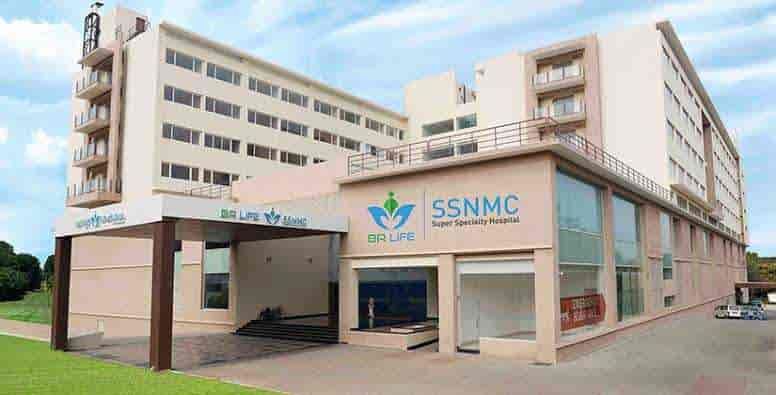
The Padma Shri visionary leader Dr B.R. Shetty is the owner of BR Life, a renowned healthcare services organisation that was founded in 1975. The organisation sees more than 5 lakh patients a year and has more than 1000 beds. Additionally, it has reached the landmark of more than 500 completed kidney transplants. The organisation operates four hospitals in India Bangalore (Karnataka), Thiruvananthapuram (Kerala), Bhubaneswar (Odisha), and Udupi. It also operates super-speciality hospitals in Nepal and Egypt.
The most recent hospital to join the group is SS Sparsh Hospital (Mysore Road) in Bangalore. The hospital includes amenities like tertiary Care, 400 Beds, Modern Infrastructure, Detailed Clinical Facilities, 20 Specialties, and a World-Class Organ Transplant Team. The first hospital was Sree Uthradom Thirunal (SUT) Hospital in Thiruvananthapuram. E. K. Nayanar, a former chief minister of Kerala, officially opened Sree Uthradom Thirunal Hospital in Thiruvananthapuram. This facility performed Kerala’s first coronary artery bypass graft on a heart that was still beating.
Hospital SS Sparsh is a medical facility that specialises in multi-organ programmes for transplants. Sparsh Hospital is a brand new facility located in a peaceful, green neighbourhood. It offers a relaxing, spacious, uncluttered, pleasant, and compassionate atmosphere that immediately relieves stress. The place is so calm that it hardly resembles a hospital. Roomy lobbies, spacious hallways, and well-designed rooms with opening windows can reduce tension. Healing will be speeded up by all of this, along with a host of additional comforts. A top medical team, advanced technology, and a commitment to excellent care are all used to support these services.
SS Sparsh Hospital is a 400-bed tertiary care hospital with cutting-edge facilities in Bangalore (Mysore Road). It believes in delivering preventive, curative, and rehabilitative services to patients from all socioeconomic tiers to serve the community. The hospital offers best-in-class procedures and has cutting-edge infrastructure. Modern technology, ergonomically constructed modular operating rooms, and a specific department for international patient services are some of its features. The branches are thoughtfully positioned for quick access in the event of a medical emergency or casualties.
Other services include a medical information centre and interpreters.
8. Meenakshi ENT Specialty Hospital (MENTS)
Location- Banashankari, Bangalore, India
Established in- 1998
Total Beds- 30
Number of Doctors- 11
ENT-Specialty

Dr PS Pradeep Kumar founded MENTS Hospital in 1998 not long after completing his training at Meenakshi Mission Hospital and Research Centre in Madurai. In Bangalore, MENTS Hospital is a cutting-edge medical facility. For illnesses and problems of the ear, nose, and throat, MENTS Hospital offers renowned medical care.
Since its establishment in 1998, MENTS Hospital has solidified its position as India’s leading provider of ENT services. In addition to providing high-quality care, MENTS Hospital offers a variety of programs and services tailored to patients, their families, and communities. Everyone benefits from the constant efforts of its committed doctors, nurses, support staff, and volunteers as they carry out their commitment to providing professional quality with personal concern.
A wide variety of disorders are seen in patients of all ages during an ear, nose, and throat surgery procedure, from an infant with a threatened airway to an old man with severe throat cancer. The expertise required to care for the patients is also varied, ranging from microsurgery to address issues with the middle and inner ear to major head and neck surgery. Its surgical techniques include tonsillectomy, rhinoplasty, ear tube insertion, and adenoidectomy.
Today, MENTS Hospital is self-contained and has 3 operational theatres that are completely functioning and can accommodate different ENT operations. Additionally, MENTS Hospital has internal divisions for voice centres, laryngology, general otolaryngology, head and neck surgery, speech-language pathology, vestibular and balance disorders, and laryngoscopy. With its comprehensive setup, the outpatient department may provide inquiry and treatment for things like audiometry, otoacoustic emissions, BERA, hearing aid labs, speech therapy, sleep study labs, video endoscopies, and clinical labs, and allergy testing.
9. Sagar Hospitals
Location- Banashankari, Bangalore, India
Established in- 2002
Total Beds- 415
Number of Doctors- 28
Multi-Specialty
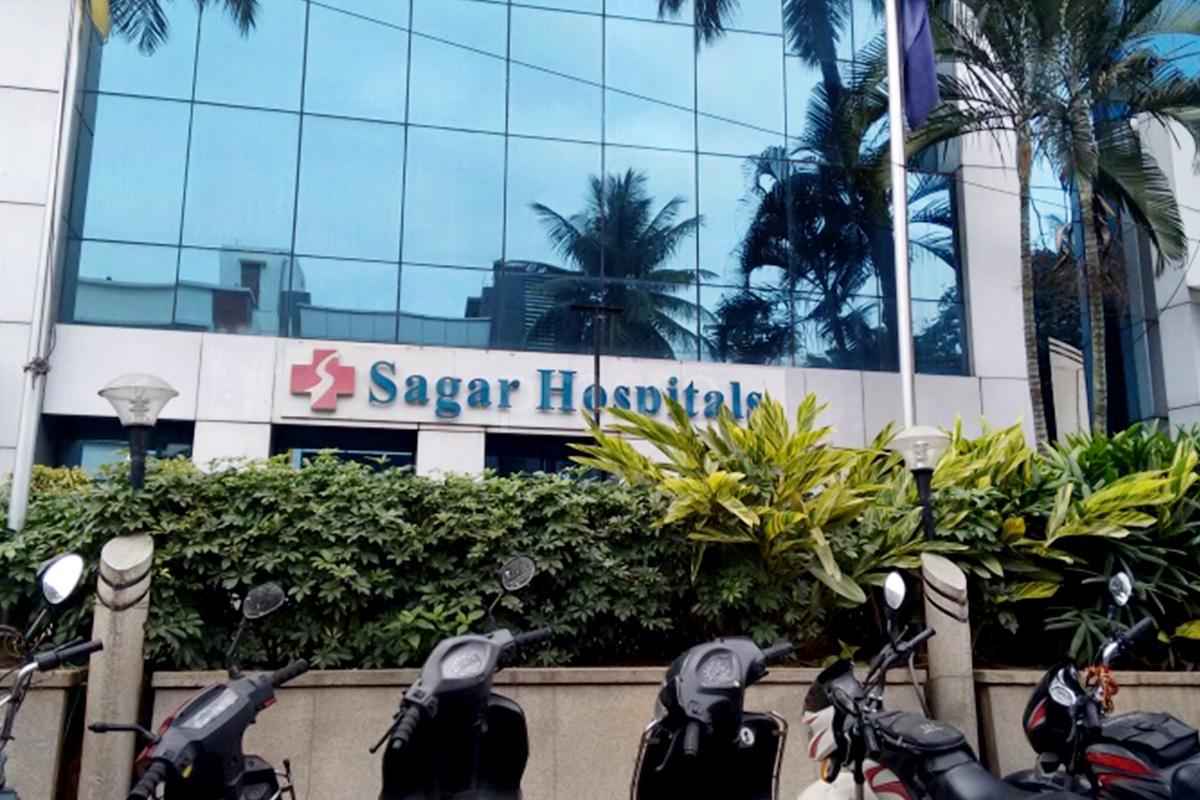
In the 1960s, the Sagar Group entered the healthcare industry with the opening of Chandra Nursing Home, under the skilful direction of Dr Chandramma D Sagar. Her two sons, Dr D Hemachandra Sagar and Dr D Premachandra Sagar continued her legacy and vision almost forty years later. In the year 2002, they founded one of the first corporate, 250-bed, multi-speciality tertiary care hospitals in the city of Bengaluru, embarking on the journey of offering world-class healthcare at an affordable cost to their immediate neighbourhood.
An ambitious 415-bed, multi-speciality tertiary care hospital was built after that in 2009. Sagar Hospitals has established very high standards for the State’s healthcare industry and is identified with quality care, effectiveness, and dependability. After a bold beginning at the turn of the century, it has developed into the community’s most dependable healthcare partner. The journey started as a quest to develop the most cutting-edge healthcare workforce of doctors and other associated streams to continue to serve society.
The Sagar Hospitals are a renowned provider of healthcare services and have earned the distinction of being a top choice for both domestic and foreign patients looking for treatment at a reasonable price. The Sagar Hospitals have added a special touch of humanity to the intricate science of treatment. This hospital’s goal is to uphold a high standard of care for every patient seeking medical attention. This goal is sacred to their highly skilled and prepared staff.
In a short period, Sagar Hospitals have done surgeries, some of which were unique and demonstrated the creative use of current medical knowledge. For the benefit of patients, a chain of pharmacies supports it. Bangalore has Sagar Hospital’s two tertiary care multi-speciality hospitals with 665 beds, four clinics, and a level of professionalism that is comparable to that of its peers internationally.
In India, the healthcare industry has taken on a crucial role in the country’s overall growth paradigm. As a result, it should be considered in overall strategic thinking rather than being treated as a purely social component of planned economic growth. This is due to the shifting balance of the world’s economies, which favours rising nations like India and pushes the giants above their robust boundaries. Sagar Hospitals is attempting to position itself so that it may integrate its corporate goals with national strategy after realising the necessity to be a part of this crucial period of the nation’s transition.
10. HCG- The Specialist in Cancer Care
Location- Sampangiramnagar, Bangalore, India
Established in-
Total Beds- 192
Number of Doctors- 28
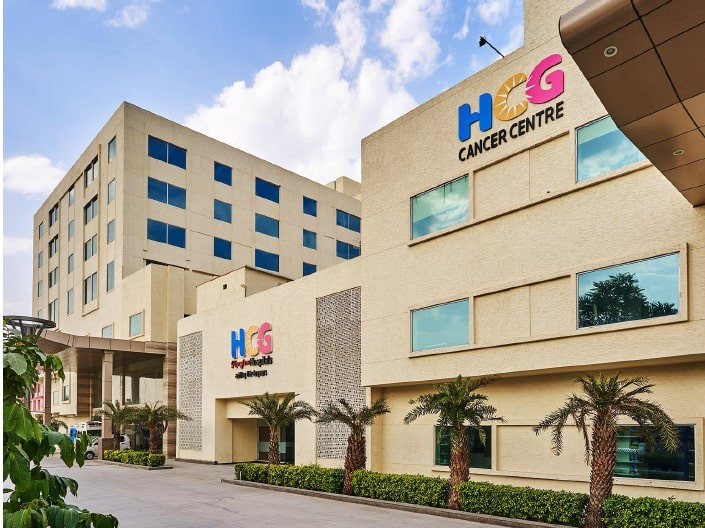
Dr BS Ajaikumar established the healthcare organisation known as HealthCare Global Enterprises Ltd. HCG, which has its corporate office in Bangalore. It has a pool of more than 450 experts in a variety of fields. The primary areas of focus for HCG include cancer treatment, tertiary care, infertility therapy, advanced screening, and diagnostics.
Four distinct organisations fall under the umbrella of HCG: Trieste Sciences, the Centre for Oncology Diagnostics, Milann, The Fertility Centre, and HCG, the Specialist in Cancer Care. To provide patients from all backgrounds with the best possible clinical care, these organisations have been thoughtfully placed throughout India.
As a result of its expansion into Tier II and III cities, towns, and villages in India, HCG’s operations are dispersed throughout around 20 cities. HCG has established comprehensive cancer centres outside of its locations in India, including Nairobi, and Kenya. With a primary focus on offering precise diagnostic support and delivering the best calibre of patient care, HCG embraces value-based medicine.
When it comes to disease diagnosis and treatment, HCG uses a multidisciplinary approach in which experts from several fields collaborate to precisely assess patient data, standardise the therapeutic strategy, and generate efficiencies that will eventually result in efficient disease management. Since its founding, Bangalore’s HCG Cancer Centre has transformed cancer treatment and helped patients live longer healthier lives. It began in Bangalore and has expanded to become India’s largest network of cancer care hospitals. Cyclotron and PET-CT technologies were first introduced in India at HCG, a cancer centre.
To guarantee that patients receive the best care and treatment, HCG uses an integrated approach to cancer care that combines a skilled team of doctors with cutting-edge technologies. Access to comprehensive cancer care, including prevention, screening, diagnosis, and treatment, as well as rehabilitation and supportive/palliative care, is available to patients.
Modern imaging technologies like 3T MRI, PET-CT, and SPECT are available in the diagnostic centre of the HCG Cancer Centre in Bangalore. Modern diagnostic testing is offered by Strand Life Sciences speciality laboratories, which are also experts in oncology testing. This enables doctors to make more accurate diagnoses, which helps them choose the best course of cancer treatment and leads to improved clinical outcomes. The following are the services offered under medical oncology:
- Cancer of the blood
- Paediatric cancer
- Breast wellness
- Prevention of cancer
- Chemotherapy in daycare
Shorter hospital stays, minimally invasive robotic surgery, and organ preservation has replaced more radical surgical techniques at HCG Bangalore. The procedures conducted consist of:
- General cancer procedures
- Gynecologic oncology procedures
- Breast operations
- Urooncology procedures
- Ortho-oncology operations
- Head and neck cancer operations
Patients in the radiation oncology division have access to cutting-edge tools including CyberKnife Robotic Radiosurgery, Da Vinci, and TomoTherapy-H, which enable pinpoint accuracy in the targeting of tumours. For leading authorities in oncology, such technology enables the development of novel therapies that go beyond current clinical standards. This enables people to recover quickly and return to their regular lives.
Conclusion
Public health and economic development both depend on rethinking healthcare to include social determinants of health. To address the complex societal factors that contribute to health disparities, nonprofit hospitals, private health foundations, governmental organisations, and other organisations must work together. The expanding body of research indicating that measures to enhance a community’s social and economic health can have a major influence on its residents’ physical and mental health is prompting hospitals to take action.
edited and proofread by nikita sharma




